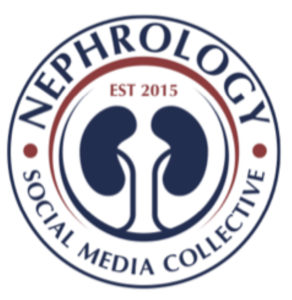April 11th, 2019
The Nephrology Social Media Collective
Justin Davis, MBBS
Thinking back on it now, I can’t quite recall why I first decided to get a Twitter account. My suspicion is that I wanted to follow the amusing tweets of Jim Sterling who works in the videogame industry and whose work I closely follow. What did happen, of course, is that I eventually realised that, aside from amusing tweets from video game personalities (I might have also done it to follow some of the bigger streamers for Destiny, one of my favourite games, but we’ll never know for sure), you could also follow a whole bunch of medical journals (such as the New England Journal of Medicine, to pick an entirely random example) who would tweet out important information about various trials or other medical titbits. Naturally, being a current advanced trainee in nephrology, I gravitated towards nephrology-based journals and publications, and that’s where I stumbled across the topic of today’s bunch of words on a website.
If you don’t work in the field of nephrology (and most of you probably don’t — I mean, I don’t know why, because nephrology is awesome, but most of you probably are in other fields), or even if you do work in the field of nephrology, you probably haven’t heard of the Nephrology Social Media Collective (NSMC). I’m not sure if my current bosses are aware of my involvement in the NSMC or even know that it exists, but therein lies the point of this blog post, no?
Before I go on, let me point out a couple of things. The first is that I’ve been lucky enough to land an internship within the NSMC this year (more on this later). I’m humbled that people would enjoy these random, slightly incoherent collections of words enough to allow me to be part of their internship program (which is surprisingly more involved than I had initially suspected — there’s even a curriculum). The next is that I’m writing about this for a couple reasons. One is that I’m very proud of my chosen speciality for taking the lead and spearheading a program like this, which to the best of my knowledge hasn’t been replicated elsewhere, to increase use of social media as it is increasingly taken up by various medical facilities. NSMC supports free open-access medical education (FOAMed), which provides access to knowledge not only to those from advantaged areas but perhaps others that are less so (for an example of an amazingly well done open-access resource, check out Radiopaedia, led by a fellow Aussie, Frank Gaillard — I’m always proud of anything that someone from the Land Down Under manages to create). The second (the second point of my second point — does that work?) is that I feel privileged to be a part of this collective and want to promote their work to a wider audience, in hope of both increasing exposure and perhaps spurring the thoughts of those outside of the nephrology field to find out what might be available through social media.
So, as for the NSMC itself (and apologies to any of the faculty if I slightly mess this section up, but this is to the best of my understanding), it is a program launched in 2015 by a group of nephrologists with the aim of mentoring a new generation of nephrology-based colleagues with informative, engaging, and educational content on a social media platform (Twitter being the main one, but also through their website at NephJC and blog posts) to promote nephrology-based FOAMed. They’ve developed a curriculum for new interns that promotes engagement with the community as a whole, involvement in the twice-monthly journal discussions held over Twitter with the hastag #NephJC, blog posts that critique important articles within the nephrology research community, and nephmadness (I’m non-American and not exposed to March Madness on a regular basis, but my understanding is that this is a basketball tournament), which functions in a similar way to the aforementioned basketball extravaganza with knockouts based around educational topics in nephrology. The aim, by the end of the year-long program, is to produce interns who are competent in the aforementioned skills and who are interested in producing further educational content in a free, open-access manner for others’ benefit. There’s a fantastic sense of altruism and community within the program, and the faculty gives up a lot of their time to help ensure the program’s success and ongoing growth.
I’ve been lucky to find myself amongst the fifth class of interns that has had access to NSMC. I want to promote the good work that the NSMC has been doing to further education within the nephrology community, and I hope to have something to contribute throughout my time with them. So if you feel in any way inspired by my paragraphs, I encourage you to check out the NephJC website, perhaps peruse their stuff on Twitter, or just generally get around the growing nephrology social media community. You might even see some contributions from my own Twitter account (when the Aussie time zone difference doesn’t place the journal club timing right in the middle of clinic or ward rounds. Australia, hey?). You might also learn some obscure, but interesting, facts about Super Mario games, because they’re fun to retweet too.
“Where you come from is not important. It’s for what you do that you will be remembered”.
Yes, there are ongoing quotes. Because, why not?
Categories: About Residency
Tags: communication, resident experience, social media, technology
You can follow any responses to this entry through the RSS 2.0 feed. Both comments and pings are currently closed.
2 Responses to “The Nephrology Social Media Collective”

2021-2022 Chief Resident Panel
Abdullah Al-abcha, MD
Mikita Arora, MD
Madiha Khan, DO
Khalid A. Shalaby, MBBCh
Brandon Temte, DO
Resident chiefs in hospital, internal, and family medicine
Learn more about Insights on Residency Training.
Most Commented
-
Follow Insights on Residency Training via Email
 NEJM Journal Watch – Recent General Medicine Articles
NEJM Journal Watch – Recent General Medicine Articles-
Tag Cloud
- Academic year advocacy aging art of medicine attending burnout Career Chief Resident Christmas communication community Coronavirus COVID-19 diabetes end-of-life care evidence-based medicine family medicine healthy choices Internal Medicine international medicine job interviews medical education medical students mentors oncology Pandemic patient care pediatrics Physician grief reflections Residency residency interview resident autonomy resident blog resident burnout resident experience resident wellness social justice student experience teaching technology thanks Ultrasound vaccinations wellness





Hi Justin, it’s good to know you enjoy what you are doing right now. Nephrology is a specialty of medicine and pediatrics that concerns itself with the kidneys: your right, sound’s very interesting. Good luck for your future, it’s gonna be more interesting in your end as you discover and learned more.
Internal Medicine Doctor in Houston
I want to be Nephrologist